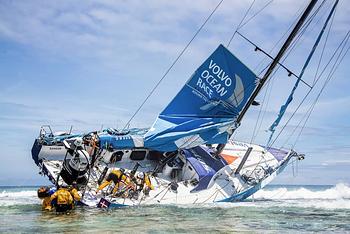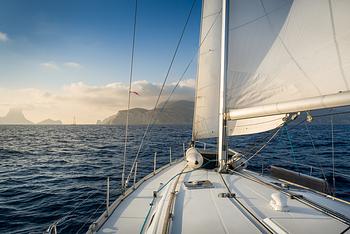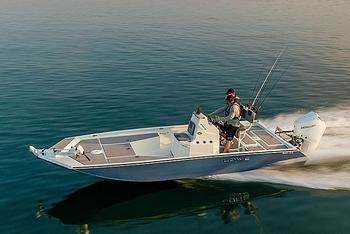Energy generated by solar systems converting sunlight into energy for electrical needs has made dramatic gains worldwide in the last 15 years. However, until relatively recently, solar panels that could withstand the harsh marine environment were just a dream.
Fortunately, a new reality has emerged. The boating community can now choose from numerous solar brands that fit any person’s boat, budget, and power needs without skimping on safety, durability, and efficiency. Solar panels are a clean, renewable source of power that will reduce or eliminate the need for fossil fuels aboard your boat, potentially saving on fuel costs in the process, but that’s just one benefit.
Solar doesn’t produce greenhouse gas emissions, resulting in less pollution and a reduced carbon footprint from your boat. Solar panels operate silently, providing a quieter and more peaceful boating experience. They offer freedom from shore power and generators so you can stay on the water longer before needing to turn on your engine or return to shore to recharge your batteries. Solar panels are generally low maintenance and are regarded as a reliable, hassle-free power source.
They are long-lasting especially when classified at an IP67 (ingress protection) rating. This ensures they are protected from water corrosion. They are versatile in size and configuration and can be installed on most boat sizes and types. Some great mounting options include on the deck, atop a cabintop, bimini or arch, or even integrated into the sails of a sailboat.
However, choosing the right solar panels for your boat can be confusing, and with significant upfront costs, it’s understandable that you want your first solar panel purchase to be a good one!
Below are some of the top marine solar brands that you can depend on for efficiency, durability, and affordability, as well as some things to consider before purchasing any solar panel(s).
Best Premium Solar Panels
SunPower
Now owned by Maxeon, SunPower has consistently dominated the residential solar panel market, so it’s no surprise many boaters consider them an excellent option for their vessels. SunPower is a premium solar brand with the highest power output and charging capacity in its product class. This means more power in less space! SunPower is made from lightweight polymer materials within their flexible and fixed-frame options.
SunPower has a robust 25-year warranty, claiming specific modules will be at least 80 to 92 percent of the minimum peak power rating after 25 years. SunPower’s commitment to innovation and cutting-edge technology makes their solar panels an excellent choice for any boat’s size and power needs, as they have many sizes, wattages, and types of solar panels.
SunPower panels are usually more expensive than other solar panels on the market. However, their panels are highly durable and efficient. The other challenge for some consumers is that SunPower does not sell directly to marine consumers from their website. To purchase one of their panels, you must contact a dealer such as Sun Powered Yachts or purchase a panel from Amazon. Sun Power’s official customer service is only trained in residential and commercial solar systems, so they cannot answer marine-specific questions. Sun Powered Yachts Website
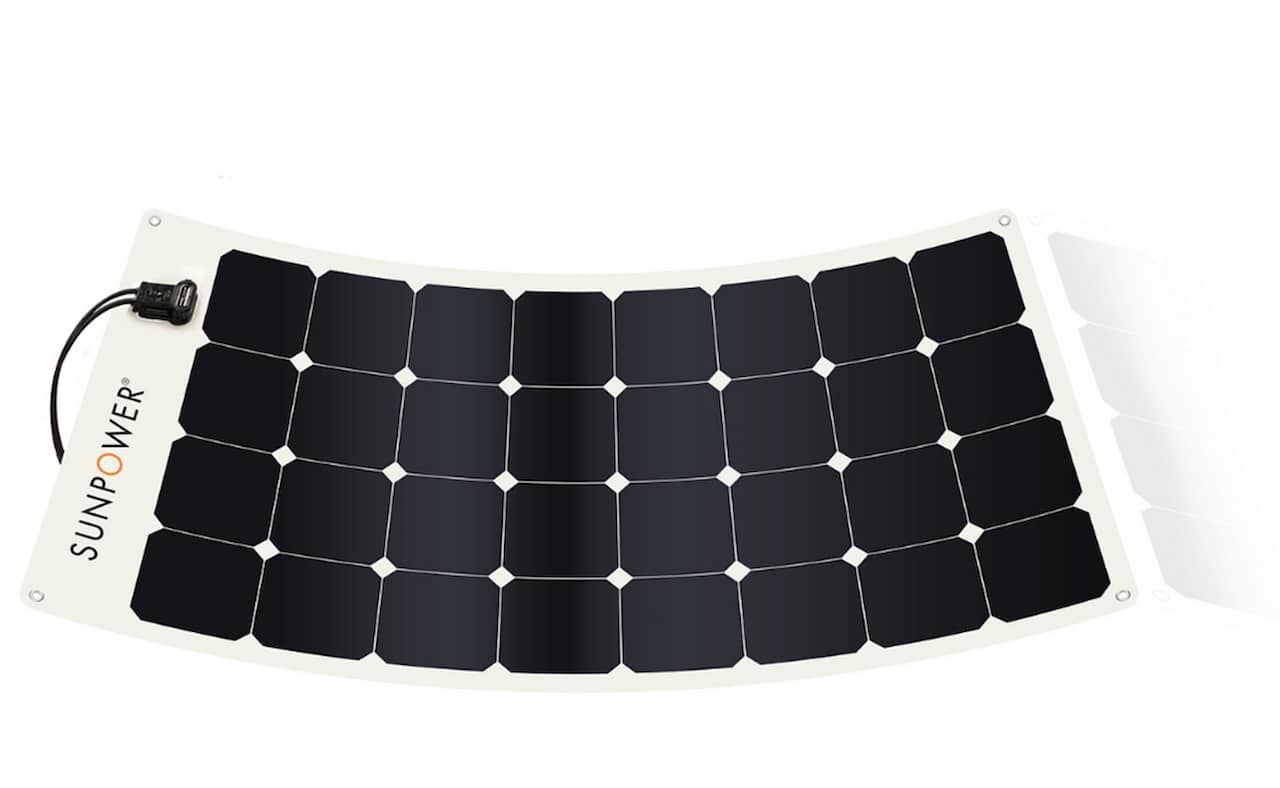
Sunpower SPR-E-Flex-100. Sunpower photo.
Solbian
Solbian is a premium solar brand specializing in flexible and semi-flexible solar panels. They guarantee the quality of the product and its duration in time. Most of their panels use SunPower’s technology to make their cells. Solbian’s panels are durable, thin (less than 2mm), and have flexible, curved surfaces, perfect for any boat deck. Their panels are lightweight, about 2.5 kg per square meter, compared to the average 12 kg in traditional panels. Solbian’s solar cells are remarkably efficient as they are manufactured in the SP series, which can give out high power in tiny dimensions.
Solbian modifies the number of cells, color, shape, and electrical characteristics to get your panels exactly how you want them. They are easy to install, both permanent and removable, and are often mounted via a structured adhesive, making installation easy. These are more expensive than other flexible and semi-flexible solar panels, but considering their efficiency and longevity, these panels will provide a good return on your investment in the long run.
Another problem buyers face is purchasing knock-off Solbian panels from scam manufacturers. You’ll know this is the case when your panel says they are an “A” grade panel. Solbian and SunPower don’t use industry grades! These vendors may also use a variation of SunPower’s or Solbian’s name, like “Solbien,” to scam people. Solbian’s Official Website
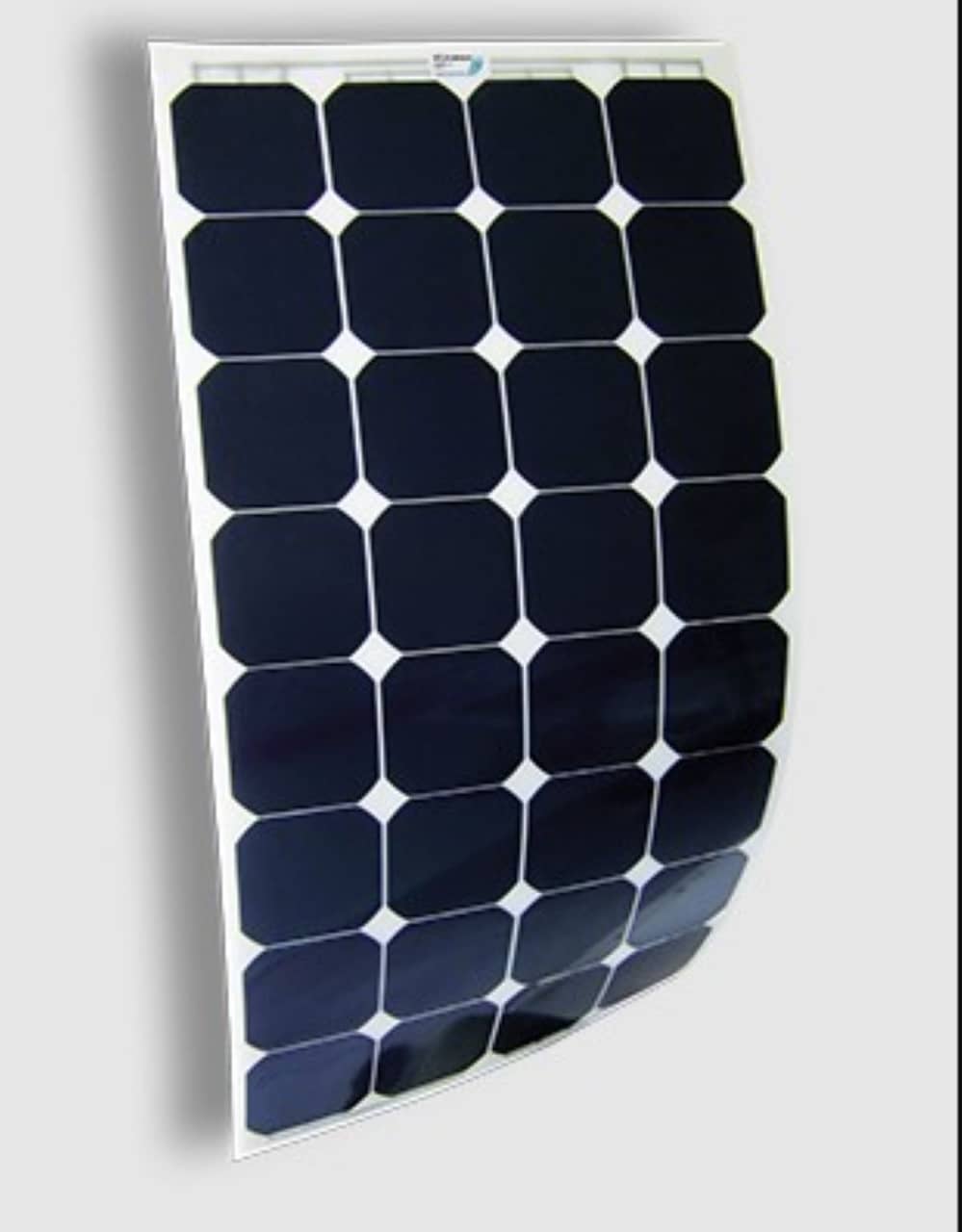
Solbian SP Series. Solbian photo.
Best Overall Solar Panels
Renogy
Renogy provides a wide range of solar panels suitable for various boat applications. The brand has established a reputation for its durable, efficient panels offered at a lower price than competitors like SunPower. With numerous options available, Renogy allows you to choose the ideal size and type of solar panel tailored to your boat’s needs.
The company offers plenty of resources and videos to aid in selecting the best panels and facilities for easy DIY installations, often requiring no drilling holes. Their panel options come in flexible and fixed-frame shapes, available in various sizes and wattages. However, while these are competitively priced, they are slightly less efficient than premium alternatives like SunPower, potentially necessitating the purchase of more or larger panels for equivalent energy capture.
Some reviews also indicate that due to Renogy’s rapid scaling, they have had challenges in maintaining strong customer service. This could result in poor user experience or issues with warranty returns. Renogy Official Website
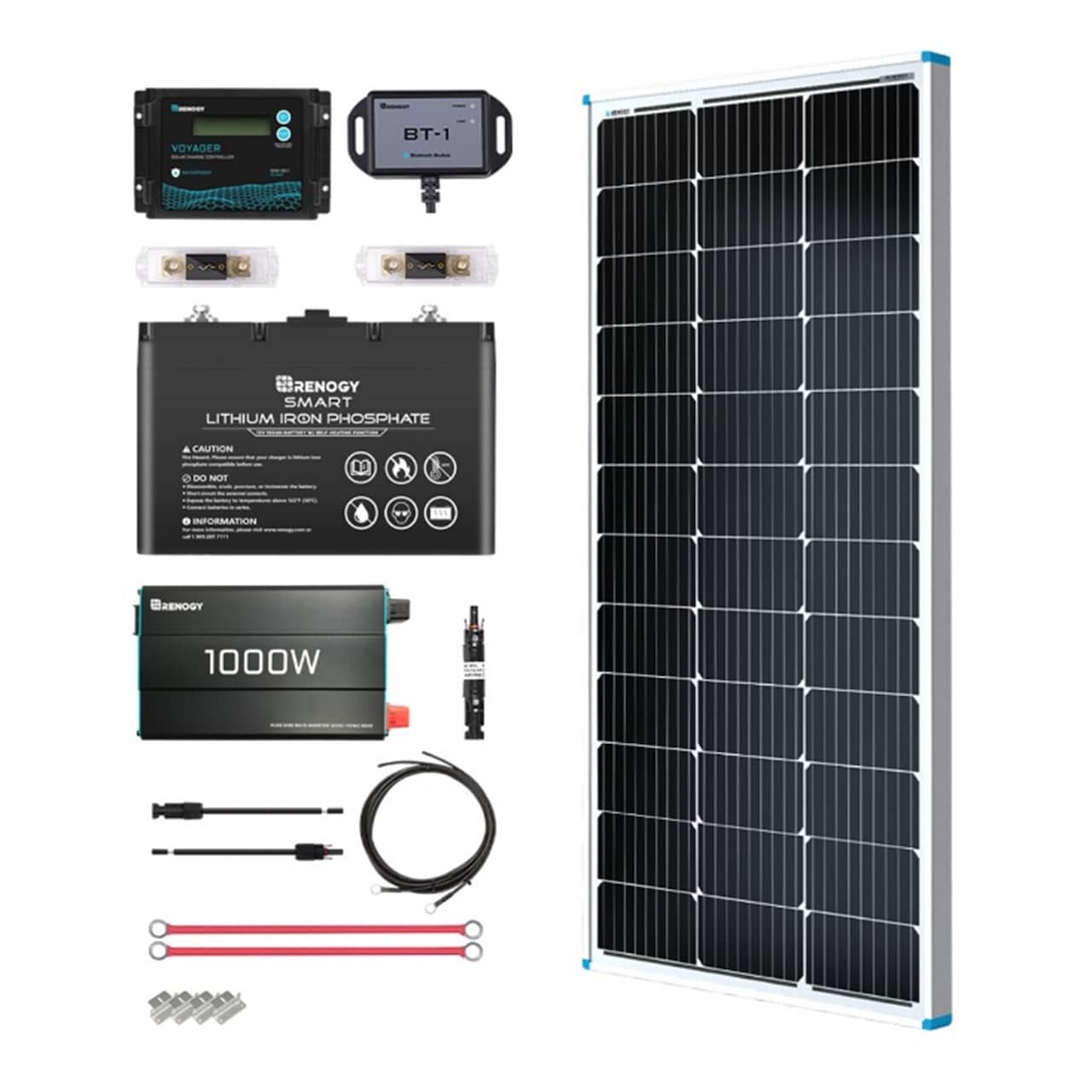
Renogy 100W 12V General Off-Grid Solar Kit. Renogy photo.
GoPower!
GoPower! is another excellent brand offering solar panels specializing in flexible panels. Their aerodynamic, durable, and lightweight panels feature a low profile while ensuring high efficiency through monocrystalline cells. These panels easily conform to almost any surface without compromising power output.
All GoPower! panels feature an impermeable lamination coat, facilitating and flexing against curved surfaces without requiring custom mounts. The installation options include adhesion or screws, both claimed to be straightforward and secure.
Each panel has a five-year warranty and is reasonably priced, making them a top choice. However, other options might be preferred if you’re not looking for flexible panels. Additionally, their warranty is shorter than brands like Renogy, and there is a lack of online information regarding potential panel issues. GoPower! Official Website
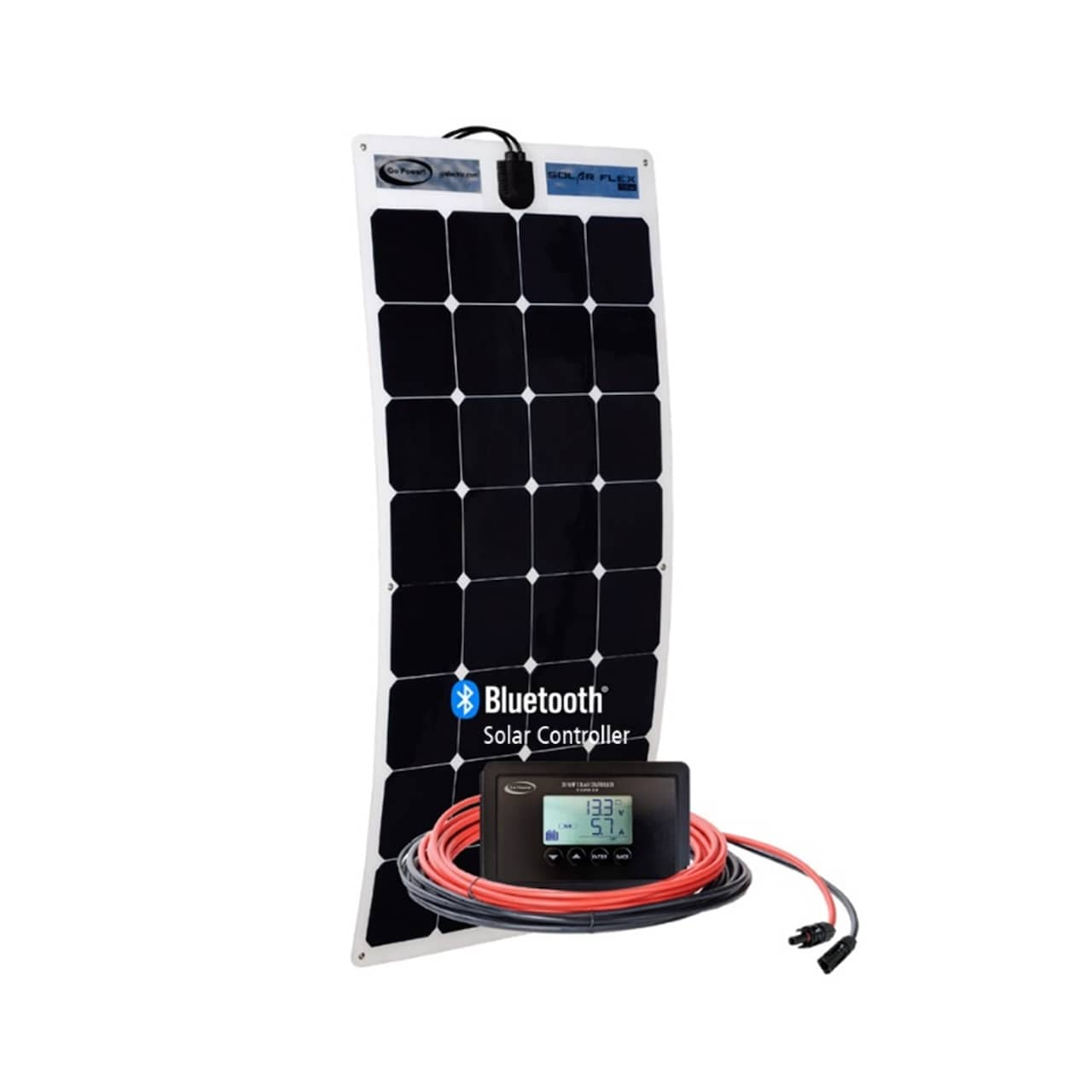
110 Watt Go-Power Flexible Solar Kit. GoPower! photo.
Best Budget-Friendly Marine Solar Panels
NewPowa
NewPowa offers monocrystalline solar panels, ideal for off-grid boating. These panels feature heavy-duty anodized frames with pre-drilled holes for mounting and a durable TPT back sheet that dissipates heat, ensuring better performance and lifespan.
NewPowa guarantees at least 80 percent maximum output within 25 years because of its high transparency due to low-iron tempered glass. Available in various dimensions and wattages, their panels cater to different needs and budgets, offering rigid and flexible options!
While NewPowa panels are among the most affordable options on the market, they are also less efficient. However, they suit small to medium-sized systems well, maximizing budget and efficiency. Some reviews suggest issues with their customer service, so consider this aspect when making your choice. NewPowa Official Website
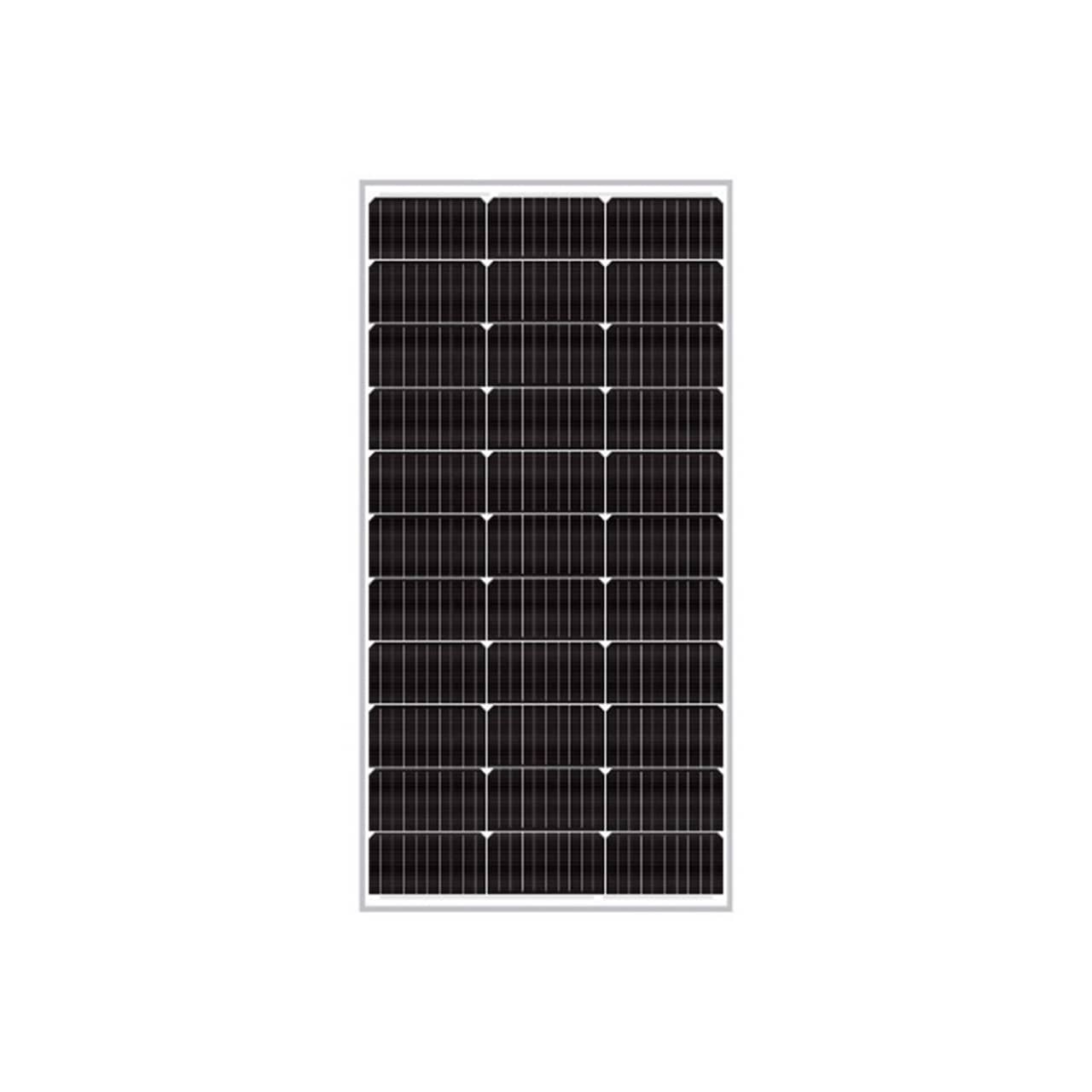
100W Monocrystalline 12V Newpowa Solar Panel. Newpowa photo.
Eco-Worthy
After 15 years of development, Eco-Worthy has become a leading provider of independent off-grid solar solutions. Rated highly for their highly efficient, budget-friendly panels, Eco-Worthy panels feature vermiculite tempered glass and an aluminum frame, ensuring durability and protection against water and saltwater corrosion.
These panels guarantee to deliver over 80 percent of their initial power after up to 25 years of use, withstanding high wind and snow loads. Easy installation using the pre-drill hole method adds to their appeal.
However, Eco-Worthy panels lack flexibility like Solbian panels, challenging placement on curved surfaces. Marketed primarily toward sailboats and yachts, Eco-Worthy panels may not suit other types of vessels. If these limitations present no obstacle for you, their durability and reasonable pricing ensure a good return on investment. Eco-Worthy’s Official Website
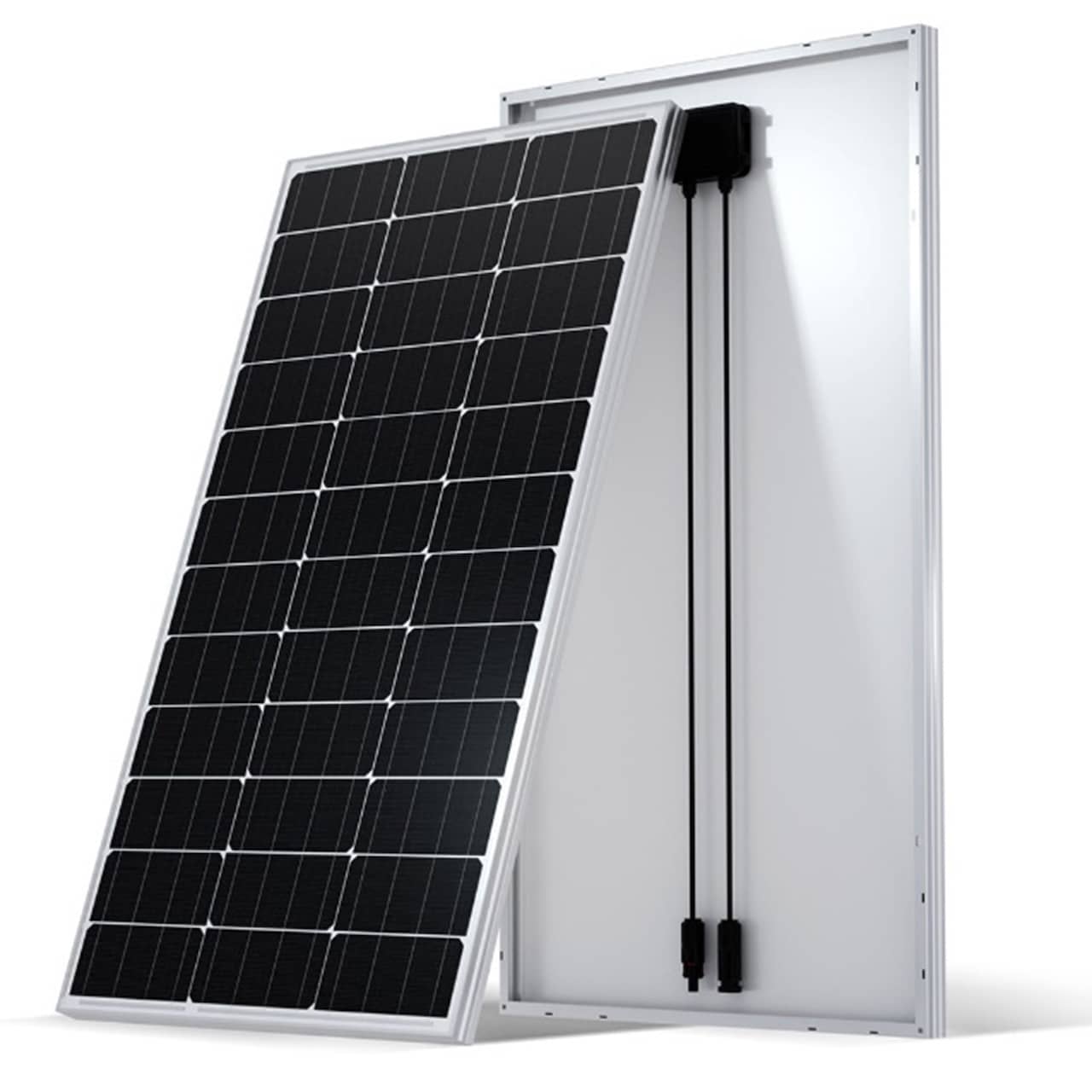
100W 12V Monocrystalline Eco-Worthy Solar Panel. Eco-Worthy photo.
Best Backup Solar Panels
HQST
For those seeking backup solar panels for emergency use, HQST offers a suitable solution. Ideal for powering lighting and navigation systems during outages, HQST provides portable solar panels that require no permanent installation.
These durable and efficient panels boast improved wiring design, ensuring at least 50 percent power production even when shaded; connecting them to a rechargeable portable power station or using the built-in USB ports to charge mobile devices is straightforward.
Their lack of permanent installation does mean setting up and dismantling after each use. Despite being less efficient than other panels and not as durable as premium options, HQST panels serve well in emergencies. HQST Official Website
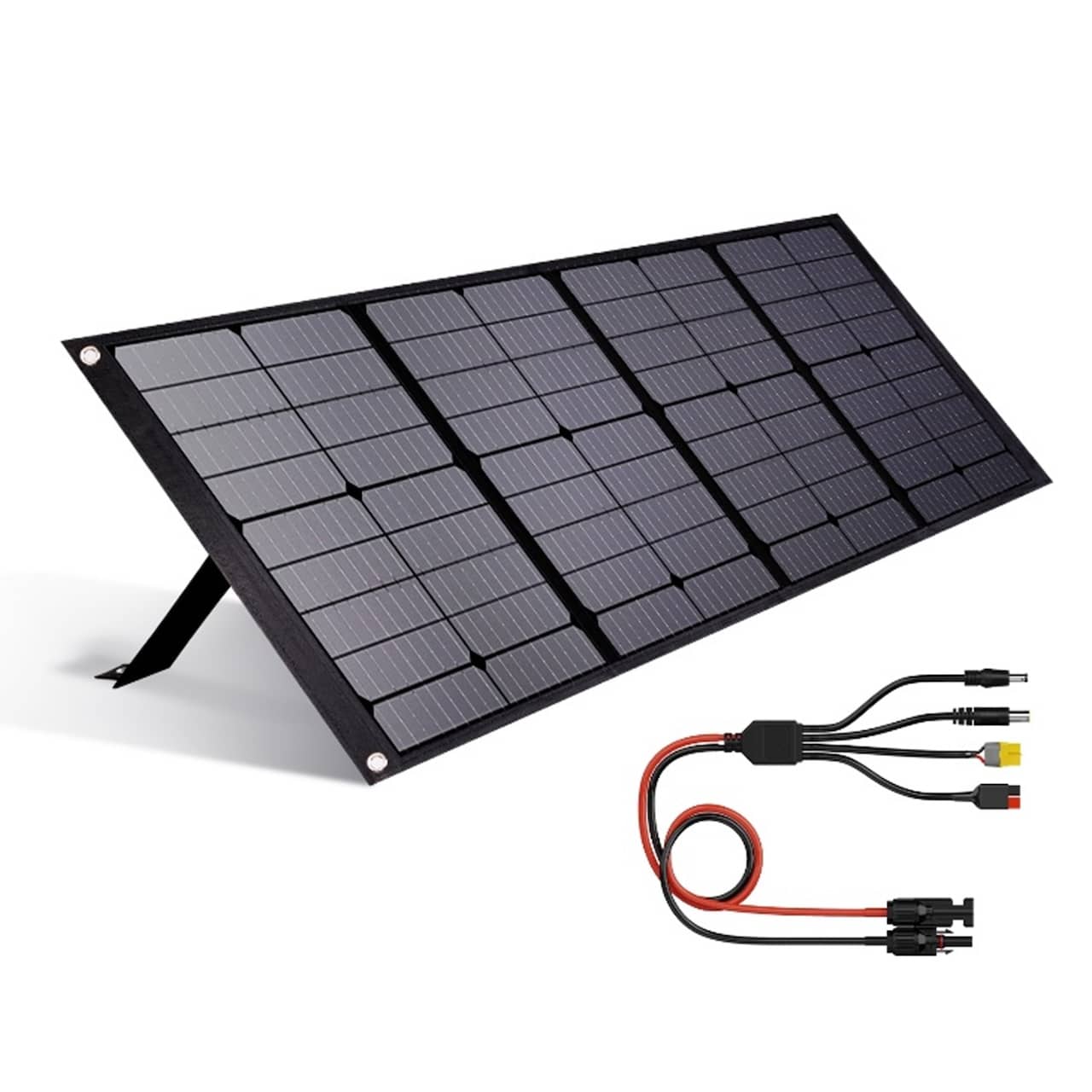
100 Watt 9BB Portable HQST Solar Panel. HQST photo.
Lensun Solar
Lensun Solar presents various foldable options suitable for emergency equipment. Their foldable solar panels, equipped with adapters compatible with most solar power station generators, feature high-quality A-grade PERC 9BB monocrystalline solar cells.
Lightweight, flexible, and boasting a higher efficiency of 23.5 percent, these panels are waterproof and capable of withstanding extreme temperatures. The kickstand design enhances solar energy absorption, making setup, carrying, and storage easy.
While they lack permanent installation like HQST, Lensun Solar’s portable panels serve well for charging phones and devices during emergencies or short trips. However, reviews suggest their flexible panels have a limited lifespan and may not last forever on a highly curved surfaces like a Bimini. Lensun Solar Official Website
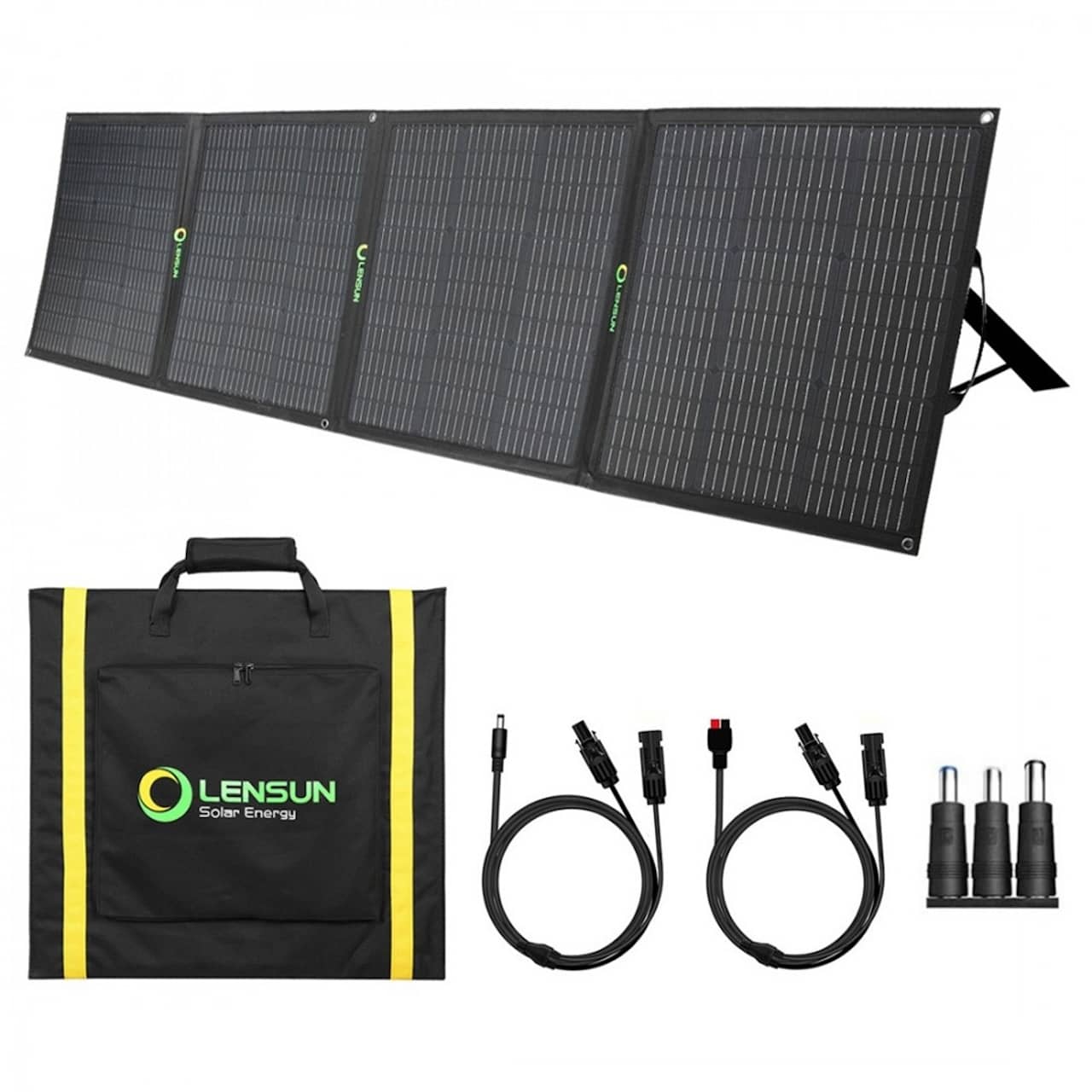
Lensun 200W 12V Foldable Lensun Solar Panel for GoalZero. Lensun Solar photo.
8 Points to Consider Before Buying Marine Solar Panels
Purchasing a solar system for your boat requires research and planning, considering power needs, budget, and configuration. While learning may take time, the information is readily available. Here are key considerations before buying solar panels from the mentioned brands or any other brand:
Power output
Begin by identifying the amount of energy needed. Create a list of every electrical system, appliance, or other device you want to power using solar energy, such as your cooler fridge, phone, kindle, etc. Calculate the energy requirement for each device by converting the current into amperes and multiplying it by the daily usage time.
Add up these ampere-hour totals for all electronics to get the total energy consumption in ampere-hours. Estimate the average sunlight hours per day in your vessel’s location. Then divide the daily energy consumption (in ampere-hours) by the average sunlight hours to determine the daily energy requirements in watts.
Space available for installation
Boats come in various sizes and shapes, requiring measurement of available dimensions and locations for panel placement. Considerations for proper fit, secure attachment, sun exposure, and aesthetic appeal should guide your selection.
Calculate the number of panels needed by dividing the required solar panel capacity by the individual panel wattage, ensuring it doesn’t exceed the allocated dimensions and weight limit.
Durability and waterproof rating
Before purchasing, ensure the panels are waterproof with an Ingress Protection (IP) rating of IP67 or higher. This safeguards the panels from water and dust: protective encapsulation layers and materials like ethylene vinyl acetate or tetrafluoroethylene shield solar cells and electronics from moisture. Verify proper sealing mechanisms for mounting equipment to prevent water ingress.
Cost
Establish a budget for solar panels, considering the balance between cost and quality. Cheaper panels may save money initially but could compromise long-term efficiency and durability. Compare prices, system components, warranties, and services offered. Consider the return on investment, evaluating potential savings on batteries or shore power over time.
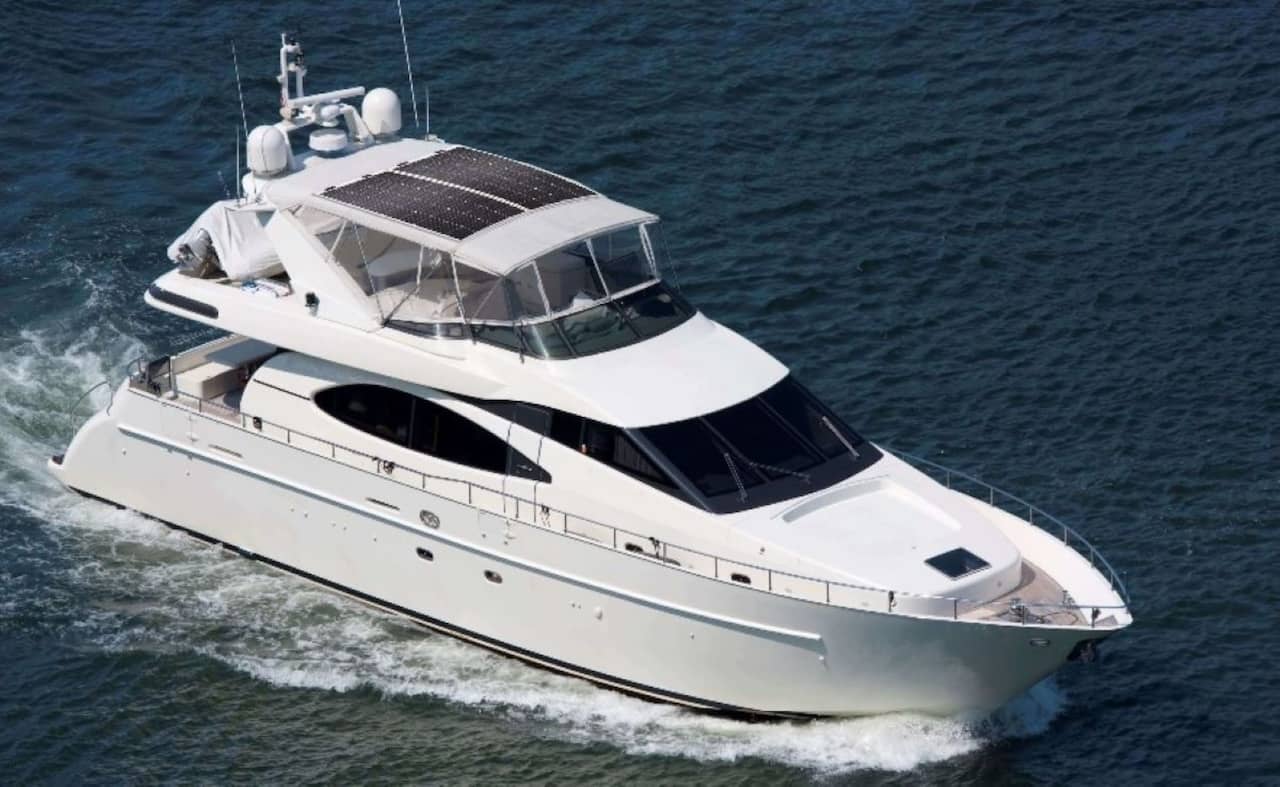
Renogy 350 Watt Solar Flexible Kit on flybridge Bimini. Renogy photo.
Brand reputation
Check for good brand ratings and customer satisfaction as indicators of a reliable purchase. Ensure satisfaction with the warranty, recognizing that while durable, solar panels are not invincible.
Type of solar panel
Select a panel type based on location needs. Rigid panels are durable and efficient but heavier, while flexible and semi-flexible options offer versatility. Portable panels are easy and ideal for small electronic devices.
Accessories
Consider additional accessories like charge controllers, inverters, mounting brackets, hardware, and batteries. Some brands may require specific accessories. Solar kits can simplify the process.
Installation
Decide on the installation approach based on your system size. Hiring an installer may save time, while a DIY approach can save money but requires more research and execution time.
Solar can be a valuable addition to most boats. While it requires research and investment, the long-term benefits, including enhanced life at sea, often make it worthwhile. We look forward to witnessing advancements in the solar energy industry. Your solar journey is an exciting endeavor that, with careful consideration, can significantly improve your boating experience.
